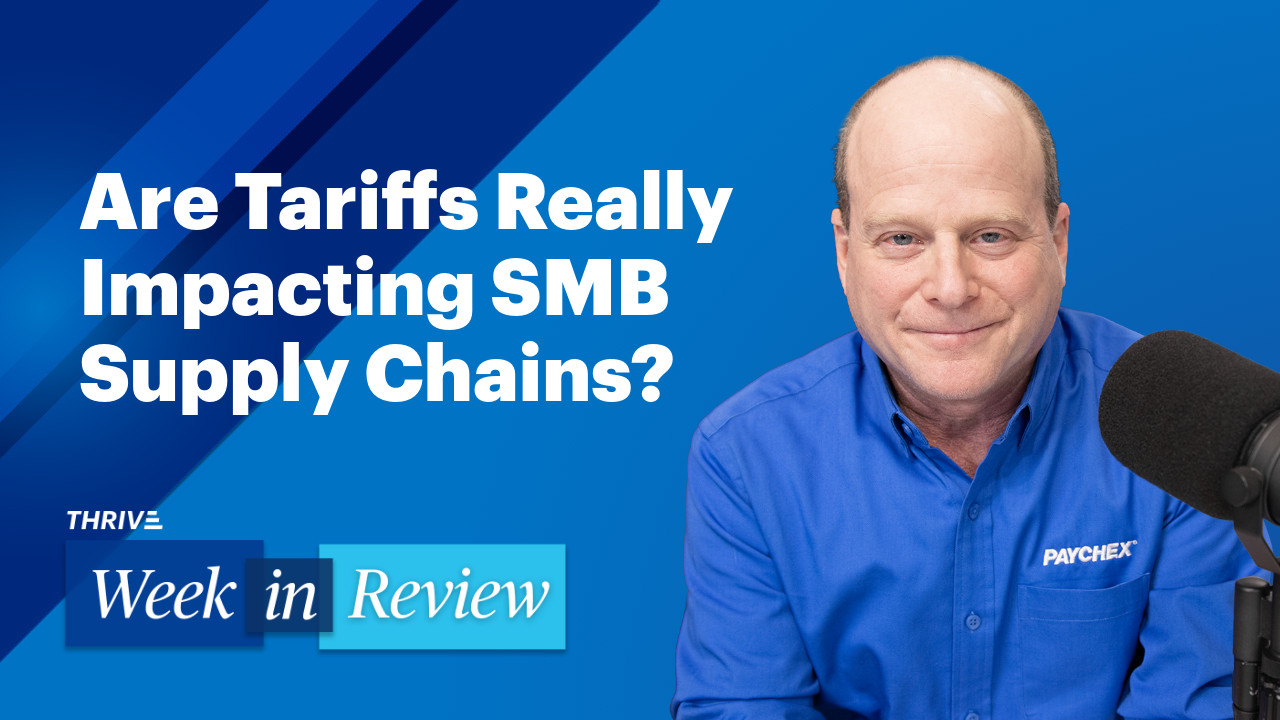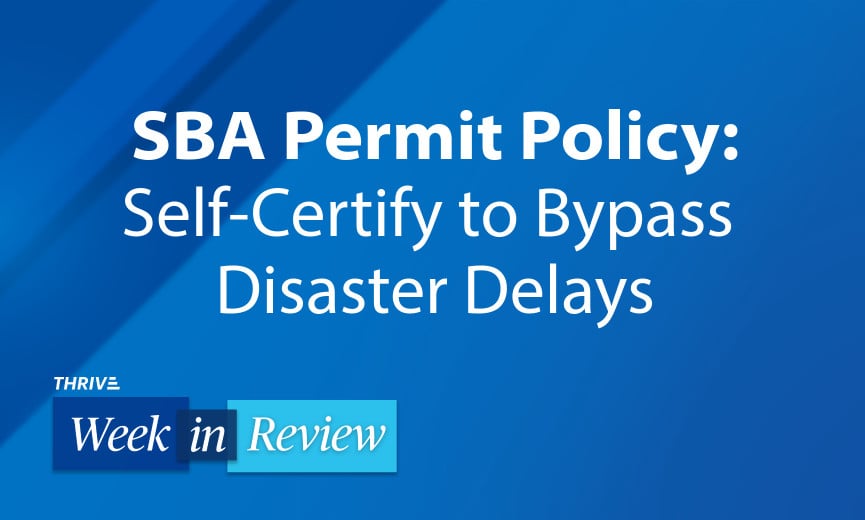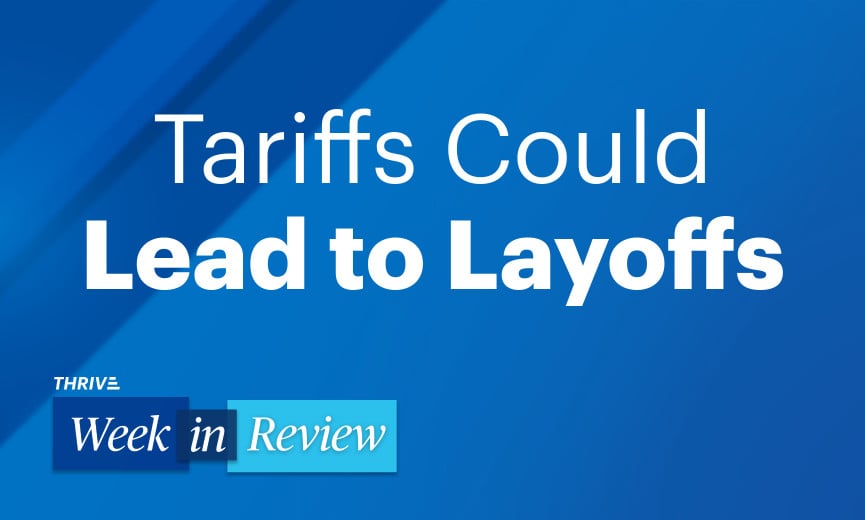- Thrive
-
Temporada
4Episodio182
Los bancos refuerzan los estándares de concesión de préstamos, se anula la norma del DOL sobre créditos de propina y se eleva la tarifa de pago a 2025
Podcast •
Vea
Resumen
Trouble getting a loan from the bank? Don’t expect help from the Federal Reserve. Gene Marks points to a few sources where small and midsized businesses can find necessary funding. One thing business owners can look forward to is not having to deal with the DOL’s tip credit rule, struck down in federal appeals court and, according to Gene, just being too complicated for employers to track. As September rolls in and businesses start planning budgets, know that one survey indicates raises will only be 3.5% in 2025 – about the same as this year – but some industries should expect lower.
Ver transcripción
[Gene Marks, host]
Hey everybody, it’s Gene Marks, and welcome to this week's episode – the holiday week episode – of the Paychex THRIVE Week in Review. Thank you so much for joining me. As you know, from watching and listening to this podcast every week, we pick like three stories from the prior week that impact your business and mine and most small and midsize businesses and I talk a little bit about my thoughts on them to help me navigate around that news. So, let's get right to the news right now.
The first story that I have for you comes from bizjournals.com. There is a report about banks tightening lending standards, putting pressure on small business owners. Let me expand with this article. The tightening of bank loans itself was detailed by Senior Loan Officer Opinion Survey on bank lending practices at the Federal Reserve. The research that the Federal Reserve did was spotlighting the second quarter.
It found that for commercial and industrial loans in particular, banks tightened their standards at a time when demand for loans was unchanged. Banks also tightened their lending standards for commercial real estate loans despite weaker demand for such loans. The second quarter activity comes after a first quarter when banks are also reported tightening of their lending standards. “High interest rates are playing a role in decisions being made by both lenders and business owners. A change could be coming in this regard. Federal Reserve Chairman Jerome Powell last week signaled that rate cuts could be ahead next month. And according to the Federal Reserve report, lenders are tightening their business lending, citing a less favorable or more uncertain economic outlook. Worsening of industry-specific problems or reduced tolerance for risk and increased concerns about the effects of legislative changes, supervisory actions, etc.”
Some lenders also noted a deterioration in their respective bank's current or expected liquidity position, as well as less aggressive competition from both banks and non-bank lenders.
So, what does this mean for your business and for mine? Okay, clearly it is getting harder to get a loan. If the Fed reduces interest rates in the coming months, which they are expected to do, it's not going to have a dramatic impact on your business, let me tell you. I mean, right now, the bank prime rate is about 8.5%. If they come down a quarter percentage, I mean, 8.25% and 8.5%, not that big of a difference.
Banks are looking very, very careful of businesses, particularly small businesses, as to whether or not they can meet their debt maintenance obligations. So, as these higher costs of interest, can they actually do it?
The good news is this: Number one, there are plenty of capital available and other resources, although they're more expensive. So, you can do the online lending marketplace is in find private capital and other forms of smaller bank capital – might cost you a little bit more, but the capitals there.
The Small Business Administration has great loan programs available. I recommend looking into the 7(a) loan program, the micro loan program, and their new working capital loan program, as well as for working capital lines of credit. They are guaranteed by the federal government and are more disposed to lend money to smaller businesses.
And finally, if you still want to go to the traditional bank route, that's fine. If you are proving good return on investment for the lending that you're looking for, banks are open to that. Just because they're making standards that much tighter, if they see a good opportunity and you can prove to them that you will not only pay back the bank, but also make money on a deal if they finance it, you will find yourself that banks are still open to that.
So, bottom line is credit is continuing to tighten. Things are still uncertain. The elections are looming, trying to figure out where things are going to go next year. So, keep those thoughts in mind as you're looking for bank financing this year.
The next story has to do with tips. The federal Fifth Circuit Court of Appeals struck down the Department of Labor's final tip credit rule. Let me read this out to you and then I want to explain it to you, as well. “On August 23, the Fifth Circuit U.S. Court of Appeals vacated the Department of Labor's interpretation of the tip credit rule and action which effectively voided the rule nationwide.
Now, what is a tip credit? Just to say, take it very simply, if you're if you're in a state where minimum wage is whatever it is – I'm in Pennsylvania, the minimum wage is $7.25 an hour. Usually, the minimum wage where you tip the worker like the server in a restaurant is about $2.13 an hour. You can pay that minimum wage as an employer as long as the employee is getting tips that exceed the overall minimum wage of your state and, of course, the federal government, which is also $7.25. If they're not making money to exceed that number, then you have to make up the difference, okay?
So, the Department of Labor looked into this rule and try to expand the definition of employees that can get tips under this rule and where which would expand the liability of employers to make sure that they are getting at least the minimum wage under this rule. I'm not going to go into details with all the things the Department of Labor wanted to do, but suffice it to say, they really complicated the issue.
The Circuit Court of Appeals, the Fifth Circuit Court of Appeals, said that the Department of Labor’s rule is so granular in dividing up an employee's component tasks that would be eligible for tips that they determine that a single occupation could particularly break apart into many occupations and basically just make things more complicated.
So, what is it for you? If you're running a coffee shop or a restaurant or somebody in the service industry where employees do get tips, the takeaway is this: You can ignore the Department of Labor's new rule on breaking down tips. They may decide to appeal this decision. I don't know if it's likely or not, but for now you want to just keep doing what you've been doing, which basically means that you want to make sure your employees are at least earning the minimum wage, including what you're paying them and tips. Otherwise, you have to make up the difference. And you have to at least be paying them $30 a month in tipped income. That's been a law, you know, for a while.
Now, your state may have different requirements. So, make sure you talk to a payroll specialist, maybe somebody, a Paychex or a labor attorney just to make sure you're in compliance. But with this new rule from the Department of Labor, you don't have to worry about it. It's been overturned and it's really up in the air whether or not it's going to be appealed.
All right. My final bit of news comes from a company called PayScale. PayScale is a company. It's a platform where you can go to like look at comparative salaries and do research on compensation. They released their report about raises for 2025 and this should interest you because as we're sitting here in August and September, you are looking to consider what are your raise is going to be for next calendar year.
So, let me share with you what PayScale has found, okay? Workers should expect on average a 3.5% pay increase in 2025 compared to the average 3.6% that was shown in 2024. By the way, this is the PayScale salary budget survey. They are both down from the 4% average that we saw in 2023. The biggest salary bonus will go toward those in science, engineering, and government, while those in retail customer service, and education will see the smallest average pay increases.
Most employees are expected to still get a pay raise in some kind in 2024, about 85%, compared to about 83% in 2023, according to PayScale. Other data, about 15% of the companies surveyed said their salary budget will be lower next year than in 2024, compared to about 19% of companies expecting higher budgets this year. The real estimate, the rest of the budgets still being about the same.
So, what's the takeaway from all this? Number one, most people are expecting – the majority, 60% or more – expecting their salary, budgets, and compensation to be about the same this year. Most employers will be giving raises, so they're going have to offset that somewhere else. But those raises are expected to be at about 3.5% level, which is slightly below what it was last year.
The people that are in the service industries, they're going to be getting – education – and they're going to be getting the lower end of those rates. The people that are more technical will be getting the higher end of those raise.
So, for you, as you're budgeting and planning out for 2025, the number you want to hone into is like 3.5%. I mean, you can give a little bit more and a little bit less, but just letting you know that is going to be the average in 2025 it seems now, and you want to be comparable and competitive to attract and retain the best talent. It's a good benchmark to start with.
My name is Gene Marks and you have been listening and watching this week's episode of Paychex THRIVE in Review. If you need any help with advice or types of advice or tips in running your business, please sign up for our Paychex THRIVE newsletter. Go to paychex.com/thrive. You can also get prior episodes of this podcast.
In the meantime, enjoy the rest of your week. We'll be back with you next week with some more items in the news that impact your business and some thoughts on how to navigate through that news. Thanks for watching. Listening. We'll see you soon. Take care.
This podcast is property of Paychex, Inc. 2024. All rights reserved.

 Apple Podcast
Apple Podcast Spotify
Spotify iHeartRadio
iHeartRadio









